Kenya. Preparing Future Entrepreneurs.
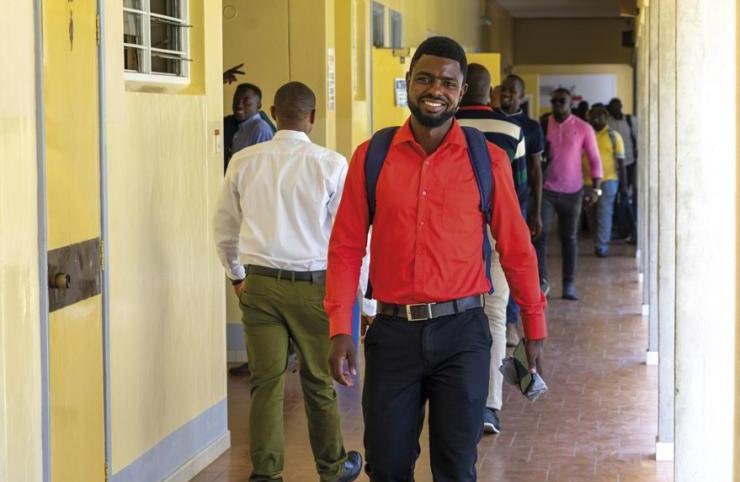
The Institute for Social Transformation (IST) in Nairobi is a leader in social entrepreneurship training in Africa. It was founded 30 years ago by the Comboni Missionaries within the Catholic University of Tangaza. Today, it hosts more than 330 students of various nationalities eager to contribute to the improvement of society.
On 25 August 1986, Tangaza University College (TUC) was born in Nairobi, the capital of Kenya. Five missionary institutes, including the Comboni Missionaries, were among the founders.
Today, the TUC is a consortium made up of 22 religious congregations. TUC has become one of the leading Catholic universities in East Africa. From just over 100 theology students with whom it opened its doors, today it hosts more than 1,700 lay students and almost 800 men and women from different congregations and 35 nationalities.
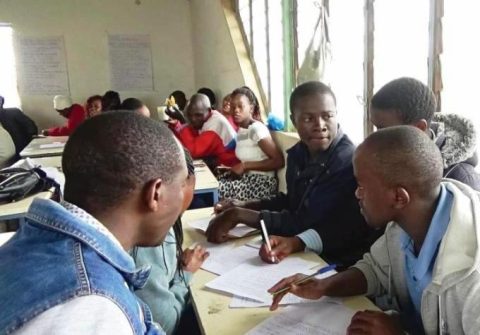
IST students during a lesson. File swm
During its 37 years of existence, more than 30,000 young people have earned one of the 59 degrees currently offered by the university. It offers a Doctor of Philosophy in ‘Social Transformation’, the first of its kind in Africa; nine master’s programs; 10 degrees; 21 higher degree courses, and 18 intermediate degree courses.
The growth of the TUC, both in terms of qualifications and enrolled students, can be explained by its founding idea of being an open academic space. This approach has allowed the creation of various initiatives within it.The need to provide adequate training to teachers in their schools in East Africa compelled the Brothers of the Christian Schools – the De La Salle Brothers – to create the Institute of Education. The Maryknoll Missionaries promoted one for the Study of African Culture; the Salesians that of Youth Studies, with the aim of offering academic training to the people who accompany young people; the Missionaries of Africa – White Fathers – opened one specialized in Interreligious Dialogue and Islamic Culture; the Carmelites that of Spirituality; while the Vincentian Family has launched a Leadership and Management Centre which provides practical skills and knowledge in the management of all types of institutions.
A Comboni project
The First Special Assembly for Africa held in Rome in 1994, known as the African Synod, invited the Church of the continent to offer qualified training to its pastoral agents to enable them to be evangelizing and transforming agents of their communities. Furthermore, the Synod insisted on the need to improve the self-financing of the African Church, which is too dependent on external aid. Starting from this invitation, the Comboni Missionaries founded the Institute of Social Ministry in 1994, which in 2008 changed its name to the Institute for Social Transformation (IST). Its current director, Brother Jonas Dzinekou, believes that this initiative is “An expression of the Comboni charism, given that the concept of social transformation that we use today actualizes Comboni’s dream of regenerating Africa and his inspiration is still present in our work”.
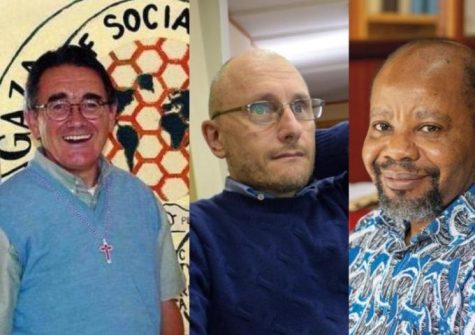
Father Francesco Pierli, founder of the Institute (L), Br. Alberto Parise (Director from 2004 – 2014). The current director, Brother Jonas Dzinekou. File swm
The inspirer and first director was Father Francesco Pierli, a former superior general of the Comboni Missionaries from 1985 to 1991. The Institute started by offering a two-year course. At first, the course was intended for non-ordained religious men and women, but slowly it opened up to lay students and consequently to the birth of new training programs with more focus on the social sciences, without forgetting the theological aspect and spiritual basis.
In 2004, Fr. Pierli was replaced as director of IST by Br. Alberto Parise who had attended the institute during his training. He has had some work experience in the Kariobangi slum on the outskirts of Nairobi. “During my experience in the field – says Brother Parise – I was able to discover the usefulness of all the content I received, but I also understood that the practical dimension had to be further strengthened. The agents of social transformation are like artists, who in addition to having creative ideas must also know how to handle the brush or callipers; that is, they must grasp the techniques that allow them to express their ideas”.
Under the direction of Brother Parise, IST training began to have a strong theoretical-practical component which continues today. This fact led to a real ‘re-education of teachers, accustomed to giving long speeches in class and seeking increasingly active participation from students ’. With this new perspective, and under the supervision of the faculty, students at all levels of the IST, from doctoral to intermediate level cycles, must now develop social and business transformation projects that they then apply in the field. Brother Dzinekou insists that “They must be projects that work, not theoretical constructions that offer no verifiable results”.
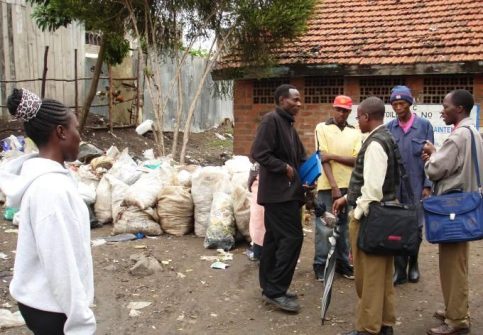
Students from the IST on a field research project. File swm
An example is the Mango Tree Trust-Kenya, an organization created in 2006 in the Kenyan county of Homa Bay for the community integration of orphans and families affected by HIV-AIDS. The project currently relies on the help of volunteers who provide direct or indirect assistance to nearly 3,000 orphans.
Other successful projects by IST alumni have been developed in areas as diverse as the resolution of inter-ethnic conflicts, the development of agriculture and livestock farming, the reintegration of marginalized people, the production of renewable energy or political support projects, such as defending the rights of people with disabilities on public transport in Kenya.
Popular education is another aspect that has been present at the IST since the beginning. Every year the teaching staff organizes numerous meetings and seminars outside the university campus. One of the best-known initiatives is Mtaani University, launched in September 2012 in the Huruma neighbourhood of Nairobi.
For the first time in the country, a university moves away from classrooms to train students directly in the environment they will have to work in in the future. Teachers go to various neighbourhoods for several weeks each term to provide theoretical training and offer concrete tools for civic education and social entrepreneurship. For the rest of the terms, students are in the field identifying problems and raising awareness in their communities. Thanks to this practical training, the transformative impact is indeed great.
Social entrepreneurship
The global crisis of 2008 warned IST leaders about the limits of development projects, which are heavily dependent on external financing. Furthermore, as Brother Parise points out, “The dynamics of the project require us to decide on the objectives before starting the journey, and this logic did not fit well with our more participatory ministerial approach. For this reason, we have started to focus more on a social entrepreneurship project model, encouraging our students to be entrepreneurs in creating social enterprises. These are not based on the donor-beneficiary duo, nor do they have a specific execution period, but rather aim at long-term economic sustainability”.
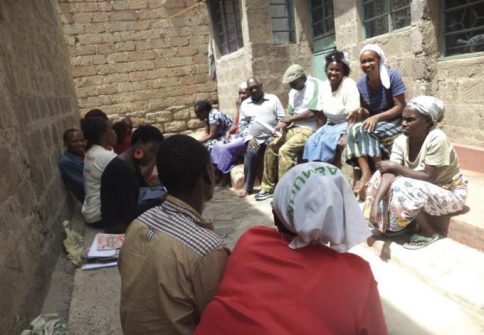
Working group meeting at Mtaani University. Photo: IST
Again, numerous examples could be cited of social enterprises created by IST alumni that have a positive impact on society. One of these, Sanpad Kenya Limited, is a sanitary pad specialist company founded by former student Lucy Kapkirwok.
The more entrepreneurial orientation of IST, started during the management of Brother Parise, was strengthened with the arrival in 2014 of Brother Jonas Dzinekou, a doctor of economic sciences with a good knowledge of the business world. “How is it possible that some young Africans risk their lives crossing the Mediterranean in search of a better life and do not see the enormous opportunities that their continent holds?” asks Brother Jonas. Without hiding the many obstacles that young Africans face, he affirms that “Africa needs the commitment of young people to create many micro-enterprises because large companies and multinationals will not solve the problems of poverty on the continent”.To help young students develop their entrepreneurial skills, the IST created the Social Innovation Sandbox, a centre integrated into the Yunus Social Business Centre network, founded by Muhammed Yunus, winner of the Nobel Peace Prize for his contribution to the development of microfinance and microcredit, as a means to combat poverty. The Social Innovation Sandbox has an economic fund to support the most innovative ideas of IST students and, according to the director of the centre, “as well as being a novelty in the Kenyan education system, it represents a good formula for combatting unemployment among young Africans”.
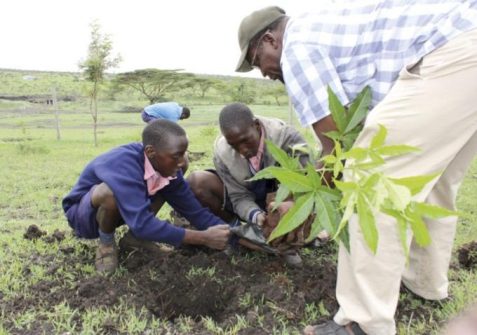
Planting the organic garden in Kajiado. Photo: IST
Since its creation 30 years ago, the IST has been able to adapt to the social needs of the African continent by providing practical and realistic training programs starting from a Christian vision of reality. He recently joined the Laudato Si’ Action Platform, promoted by Pope Francis through the Dicastery for Promoting Integral Human Development, responsible for organizing action in favour of caring for our common home.The future is not written in stone, and it is difficult to predict the evolution that the IST will undergo, but it will always maintain its vocation of educating for social transformation. “I observe our young people a lot and when they have spent two years at the centre, they are no longer the same as when they arrived. We can see in their eyes the joy of knowing they themselves are capable of improving reality, escaping the fatalism that sometimes grips young Africans”, Brother Dzinekou concludes. (Open Photo: A student at the Institute for Social Transformation (IST) – Enrique Bayo)
Enrique Bayo



